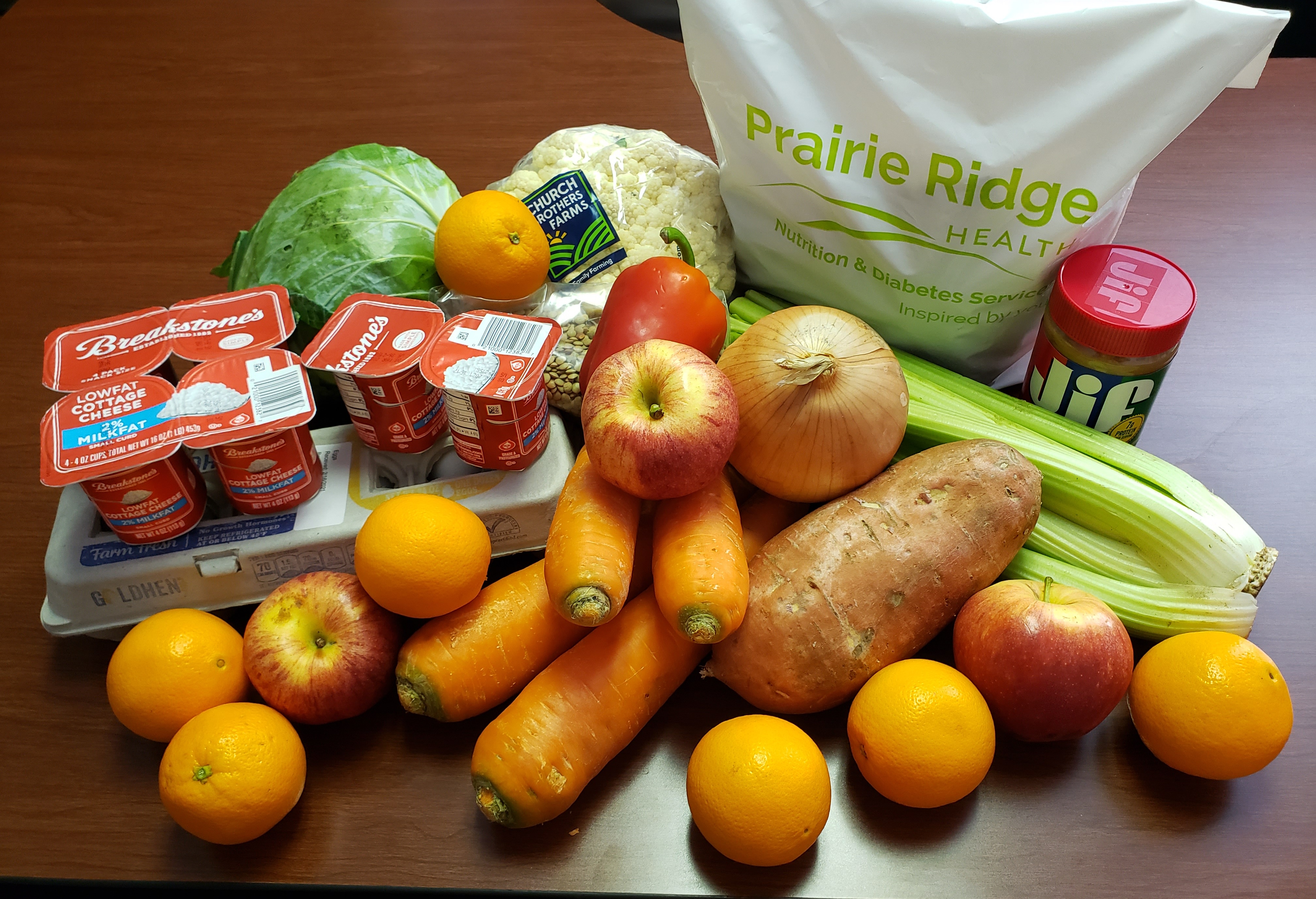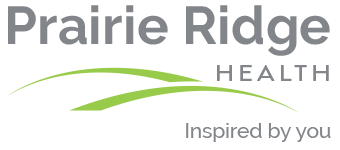Hunger Care Program

The Prairie Ridge Health Hunger Care Program provides approximately 25 pounds of lean protein, produce, and pantry staples every month to those facing food insecurity in our community. We currently provide healthy food packages to 30 families in our community every month. Hunger Care is made possible through funding from the Volunteers of Prairie Ridge Health and our Employee Giving Program.
Every month, participants receive a food package containing approximately 25 pounds of produce, lean proteins, dairy, and pantry staples. A package typically contains frozen fish, chicken or pork, fresh fruits and vegetables, eggs, dried beans or rice, whole grain bread, and peanut butter.
Recipes are provided each month to help you use your food package, and our nutrition team is available to help you brainstorm ideas to use foods you may not know how to use.
Poor nutrition can lead to nutrient deficiencies, malnutrition, and increase risk of health concerns such as high blood sugar, heart attack, heart failure, high blood pressure, depression, lowered immune function, dizziness/falls, and poor overall health. This program ensures you have nutrient-rich foods to decrease these risks and give you the tools to better manage your health.
If you or someone you know is experiencing food insecurity, please contact Rachel Selm at rselm@prairieridge.health or 920.623.1293
HungerCare Food & Nutrition Screening Algorithm
-
What providers need to be aware of:
The USDA defines food security as having “access, at all times, to enough food for an active, healthy life for all household members.”
Families may be considered food insecure if they:
• experience anxiety about having enough food in the house
• have to purchase lower quality, lower variety, or less desirable food
• have to eat less or less often
• Research shows that food insecurity can have serious health effects across the lifespan.
Children in food-insecure households are more likely to have:
• Poor overall health
• Frequent stomachaches and headaches
• Psychosocial & behavioral problems
• Worse developmental outcomes
More chronic illnesses Food insecure adults are more likely to suffer from:
•Depression
• Lowered immune function
• Hypertension
• Heart attack & congestive heart failure
• Dizziness/falls
-
How to Support a Patient Without Access to Adequate Nutritious Food.
1. Screen all patients—never assume a patient has adequate food resources. Many families may not appear to be struggling financially but are just a job loss or unexpected expense away from being food insecure. Universal screening using the two USDA-validated questions is the best way to ensure that all food-insecure patients are identified and assisted.
2. Sensitivity is key. Patients are maybe afraid to share their food insecurity concerns if they feel that they will be judged or could be reported to Child Protective Services. The questions should be asked in a sensitive and supportive manner.
Consider food insecurity status when making diagnoses and creating care plans. Could a lack of access to nutritious food be the cause of or exacerbating a patient’s symptoms? Could financial stress cause the patient to fail to take their prescribed medications?
Follow-up is important. Social workers and nurses can provide encouragement and follow-up to ensure that patients receive the assistance that they need.
-
Food Resources
2-1-1 — Call 2-1-1 or go to http://www.211wisconsin.org/
2-1-1 is an easy-to-remember three-digit phone number that connects people with free and confidential information and referral services. 2-1-1 provides callers with access to resources such as food pantries and meal sites, bill payment assistance, housing search assistance, support groups, and community clinics. 2-1-1 is free, available every hour of every day, can assist in 140 languages and is accessible in every community in Wisconsin.
FoodShareHelpline — Call 1-877-366-3635 or go to www.GetAQuestCard.org
FoodShare Wisconsin (otherwise known as SNAP) is a nutrition assistance program that provides money for groceries on a Quest (EBT) card. Feeding Wisconsin’s FoodShare Helpline screens for potential eligibility and offers appointments for free, personalized application assistance.
WIC (Women, Infants, and Children) — Call the Maternal and Child Health Hotline at 1-800-722-2295 or go to https://www.dhs.wisconsin.gov/wic/wic-offices.htm to find the county WIC office in your area.
WIC is a supplemental nutrition and health program for pregnant and post-partum women, infants, and children less than 5 years of age. WIC helps families buy specific foods for good health, supports breastfeeding, and provides information on nutrition, feeding, and offers community resources. There is no citizenship requirement for WIC.
Aging & Disability Resource Centers (ADRCs) - Go to https://www.dhs.wisconsin.gov/adrc/consumer/index.htm or call 2-1-1 to find your county’s ADRC
The ADRCs provide information on a broad range of programs and services for seniors and people with disabilities regardless of income, including senior meal sites, nutrition, home-delivered meals, and financial assistance. These services can be provided by telephone or a home visit.

